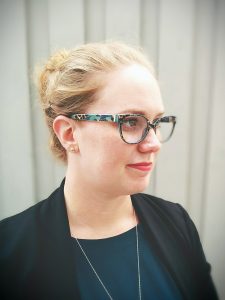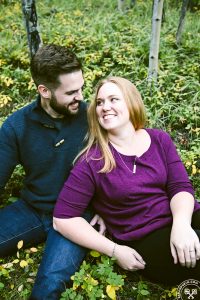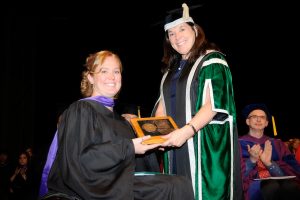 Alumna Christine Selinger (B.Ed./B.Sc. 2011) has been in the news for a variety of reasons over the years. In 2006, while a second-year Education student at the U of R, Christine was injured in a rappelling incident that fractured her vertebrae in her lower back. Just three years later, she won her first international medal at the 2009 ICF Canoe Sprint World Championships, and in total won 10 International Medals, including the first-ever 2010 Women’s ParaCanoe V1 World Championship. Also in 2010, she was the first person living with a paraplegic condition to go on an expedition through the Nookta Trail , which is an especially challenging back-country 35 kilometer hike. At her convocation in 2011, Christine graduated with Distinction and was the recipient of the President’s Medal. Christine has recently received worldwide recognition for her work on sex and disability.
Alumna Christine Selinger (B.Ed./B.Sc. 2011) has been in the news for a variety of reasons over the years. In 2006, while a second-year Education student at the U of R, Christine was injured in a rappelling incident that fractured her vertebrae in her lower back. Just three years later, she won her first international medal at the 2009 ICF Canoe Sprint World Championships, and in total won 10 International Medals, including the first-ever 2010 Women’s ParaCanoe V1 World Championship. Also in 2010, she was the first person living with a paraplegic condition to go on an expedition through the Nookta Trail , which is an especially challenging back-country 35 kilometer hike. At her convocation in 2011, Christine graduated with Distinction and was the recipient of the President’s Medal. Christine has recently received worldwide recognition for her work on sex and disability.
The following is an interview with Christine to find out where her B.Ed. has taken her:
What are you doing professionally? Where are you located?
I am now the Educator for Spinal Cord Injury Ontario in Toronto. I sustained a spinal cord injury in December of 2006, which was during my second year at the U of R, and that has helped to lead me here. I create learning opportunities for people with spinal cord injuries, their loved ones, healthcare professionals and essentially anyone who wants information about spinal injuries.
In my current role I create online, blended, and in-person learning opportunities – meaning, that I provide educational opportunities through several different mediums. I manage projects related to learning and build those learning opportunities to be available across the province, country or world (depending on the project and its scope). I host and develop webcasts and online meetings. I design, develop, and implement training opportunities through the use of the authoring tools Adobe Captivate and Camtasia Studio.
I also still privately tutor Mathematics and English in the evenings (after work). I love working with students and found that I really missed that interaction in my everyday work. In 2013 I was the Lead Instructor for a Math tutoring agency called Mathnasium, but now I privately tutor students.
How did you come to live and work in Ontario? What obstacles did you find to becoming employed? How did you overcome? What support did you receive?
I moved to Toronto just after graduation with my partner, Jerrod Smith. He was headed here to pursue his Master’s and Ph.D. in Mathematics, and I didn’t want to live across the country from him, so I picked up and moved too!
I had a really really tough time finding a job here, which was quite heartbreaking. I spent about four months applying to pretty much everything I could – everything from teaching positions to retail positions. I feel like one of the biggest obstacles I came across was that Toronto isn’t as accessible as I (objectively) think it should be, given that it is the largest city in Canada (and has the largest population of people with disabilities). I was offered several interviews, only to discover that the employers either didn’t have barrier-free access or didn’t have a wheelchair-accessible washroom. It was a really disheartening experience.
My mom once told me that every time I talked to her I sounded more and more sad. It’s hard to tell you how I overcame it – I don’t really know. My family and friends (though far away) were a huge support. Jerrod and I really learned how to lean on each other in those days as well. He needed my support to survive the grueling days of his Masters, and I needed his support in maintaining my own self-confidence.
What are you passionate about in your current work?
The reason I got involved in Education in the first place was a desire to help make the world a better place. I really feel that teachers are in the best position to do that. You can ask anyone to name their favourite teachers and it doesn’t seem to matter how much time has passed since that person was in school – they will be able to name at least one teacher, and it will usually be accompanied by stories of how that teacher helped shape them into who they are.
That drive to help make the world a better place is what I work for. In the case of my current position, I get to do that by helping people with disabilities see the opportunities in the world and helping the world see the opportunities in people with disabilities. I feel that I can help create a more inclusive and accessible world for all of us.
I also love learning, so having the opportunity to learn about new educational technologies and techniques as I grow is a huge benefit as well.
Tell a story of a great experience in your current work and what was meaningful about this experience for you.
I was given the opportunity to create resources related to sex and disability early in 2015. It’s a topic that many people are not comfortable discussing or see as taboo, but it is incredibly important for people to talk about. Sex is a part of everyday life for everyone, including individuals with disabilities, but it is often overlooked or ignored because it can be uncomfortable to discuss.
I’m comfortable speaking about sex, so it seemed natural that I would help to lead these discussions. We released a panel discussion on sex after a spinal cord injury as well as an eLearning module about sexuality and adapting sex toys for people with disabilities. It was all completed as a form of online sex education for people with disabilities.
These projects have garnered worldwide recognition. I was interviewed as a part of a piece on Broadly (a Vice Channel) titled “How People with Disabilities Have Sex,” a quote from that article landed on the podcast “Stuff Mom Never Told You” (out of the United States), and I have received notes asking for help and resources from people far and wide, including a professor in Denmark and a website out of Mumbai. I’ve also delivered conference presentations on the subject – including speaking at the Toronto Collaborative Neuroscience Symposium.
I took a course at the U of R about gender and sexual identity in schools from Dr. James McNinch and that course really prepared me for this project. I thought of it often as I prepared.
What was your experience like at the U of R? What was a highlight for you here?
I absolutely loved my education at the U of R. I’m not sure I can pinpoint a specific highlight. I absolutely loved my internship experience at Winston Knoll Collegiate with my co-op teacher Maria Canham and I reflect on that often. I also loved meeting Jerrod – we met in Modern Algebra. There were only six of us in the class and I knew four of the other students before we even started. I think that’s one of the things I really appreciated about the U of R: It is big enough that you can still get the classes and education you are looking for and yet it’s still small enough that you have a lot of contact with your peers and your professors.
How did your injury impact your studies, your athletic dreams, and any other dreams? How did your life change?
My spinal cord injury impacted pretty much everything in my life. It’s really hard to explain. Often when I talk about my experience with my injury, people assume a sort-of “poor you” mentality and that’s something I would like to debunk a little. Yes, the first few years after my injury were really tough. I had to learn how to do everything again – from getting dressed and moving around, to even figuring out how I fit in socially. But my life isn’t worse now than it was beforehand. In fact, it’s probably much richer than it was beforehand. I’ve had really amazing opportunities offered to me, and I’ve been in situations where I could jump at those opportunities and really explore them.
The most immediate change in my future goals related to my studies. I had an image – as many do – of finishing my B. Ed. in 4 years and getting a job as a teacher. After my SCI, I took a semester off to complete my physical rehabilitation, and returned as a part-time student before getting back to school full time. This meant that I was not going to finish in 4 year’s time, so I decided to tack on a little extra time and finished by B.Sc. concurrently with my B.Ed. I’m really glad that I chose that direction for many reasons: I was able to grow in my profession, gaining a much better understanding of Mathematics as well as meet a lot of amazing individuals I would not have had the chance to meet without the additional classes, including the man that is now my husband!
I had never been into sports much at all before my injury, and certainly not organized sport. After my injury, however, I found that sport was a really great way for me to connect with other people who had sustained spinal injuries, and that by spending time with other people who had spinal cord injuries I could learn a ton about how to adapt. So I kept going, and I’ve been able to try a wide variety of sports and many different levels. I had always loved water sports, so I really connected with paddling (canoe and kayak) and was given the incredible opportunity to represent Canada at 4 ICF World Championships – and won 10 International Medals, including the first-ever Women’s ParaCanoe V1 World Championship in 2010. I have now retired from paddling, at least for the time being, so that I can focus on other things, but I’m sure that I’ll be back someday.
How did you overcome the obstacles to finishing your degree and from where did you receive support?
I am a tremendously fortunate person, and my SCI really highlighted that for me. I have a wonderful family and amazing friends; I really can’t thank them enough for everything that did for me immediately after my injury. That being said, I think they may have done even more for me before my injury – they helped to shape me into the person I needed to be to face all of the challenges life would throw at me, my injury included. During my recovery I focused on each day individually and, with the knowledge that I could not turn back time to “undo” what had happened, I rebuilt myself by choosing to focus on where I was going rather than where I had been. I could not have done that without the support of my family and friends, and their knowledge that I needed to feel like myself. They didn’t treat me differently; they didn’t make me feel fragile. When I was with them, I was just Christine.
Did any professors make an impact on you and your professional journey?
I’m not sure that I could name all of the professors that had an impact on me and my professional journey. The lessons (either of subject matter or life) that I learned from them are with me every day. From Douglas Farenick (now Dean of Science, congrats Doug!) and Remus Floricel in the Department of Mathematics & Statistics, to Susan Johnston and Diana Lundine in the English Department, to Rick Seaman and James McNinch in Education and many, many more.
What are your future goals professionally/personally?
I feel like I’m at a spot where I’m just taking life as it comes. My husband will be finishing his Ph.D. in Mathematics in the upcoming year, so we’re looking at the possibility of moving, though neither of us is sure of where that might take us. I want to live somewhere where I have more access to wilderness than I do right now – and to continue creating adventures around the world.
Someday I would like to write a book, though I’m not sure what form that would take.
I want to continue working with kids and young adults. I love the curiosity and enthusiasm of youth and that is such a fun energy to be around.
Someday I hope to get back into teaching in a classroom setting, in some way.
I would also like to further my education, though the completion of a Masters and/or a Ph.D.
Ultimately, I just want to be happy.
What advice do you have for others graduating from our program?
Don’t limit your horizons. A degree in Education, and the lessons you learn through your time at the U of R, will take you many places and give you the tools to do more than you think. Take opportunities as they come, and create your own opportunities whenever you can.

CHRISTINE SELINGER | WHERE HAS YOUR B.ED. TAKEN YOU?